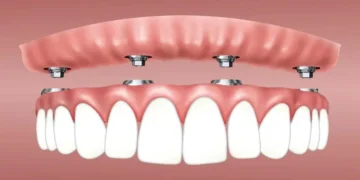Dental Bridge vs Partial Denture — What Are They, What Do They Do, and Which Is the Best?
Unfortunately, our teeth do not last forever, and a time may come when you need some of them replaced, be it due to age, injury, or decay. When that time comes, you’ll likely have to choose between dental bridges and partial dentures. What are the differences between them, and which one is the better option? The answer will depend on many factors, so allow us to explain and put the dental bridge vs partial denture debate to rest!
If you’re in the Skokie, IL, area and are looking for a dentist, or if you end up having further questions, you can check out the Dental Matters website and discover the benefits of dental bridges, partial dentures, and general dentistry.
The Key Differences
What sets dental bridges and partial dentures apart? They’re both ways of replacing missing teeth, right? Yes, but that doesn’t mean they can be used interchangeably in every situation.
A dental bridge is exactly what the name suggests: a kind of dental appliance that can take the place of a missing tooth (or teeth) and bridge the gap left after its loss. Since bridges need anchors, the teeth surrounding the gap will need crowns to support the bridge.
And partial dentures? They do the same thing, but they are not fixed. That is, you can take partial dentures off yourself, which you definitely cannot do with a tooth bridge. So, the key differences between an implant bridge and partial dentures boil down to permanence.
What Else Should You Know?
Naturally, permanence is not the only difference between these two solutions. There are a few other things you need to know about them to get a clear picture of what you can expect from them.
Partial Dentures
So, partial dentures are moveable, and you can take them off. You should also know they consist of both a base that mimics the gums and replacement teeth. Just like bridges, they can replace more than one tooth, but if all teeth need replacing, the dentist will opt not for partial but full dentures.
Dentures are usually made of plastic, but there are some that combine plastic and metal materials according to the best dentist in Vienna VA. In addition, they may come with some sort of classp that will keep them secure once you’ve put them on. If you’re concerned with appearances, you should know that these clasps are sometimes visible when you smile.
Dental Bridge
Dental bridges are a more robust alternative to partial dentures. They are made in specialized labs and fixed in place using adhesive agents. That means that once they’re on, they’re not coming off. Sometimes, bridges can be put in place without any drilling and anchoring. That is, the dentist might secure them to the surrounding teeth by means of little clasps usually called wings.
Fixed or Unfixed — What’s Better?
Since fixedness is one of the biggest differences, you might be wondering whether the freedom to remove the appliance might be a big plus. That might be the case, but you’ll have to weigh both the pros and cons of it before settling for one option.
For example, being able to remove dentures comes with the need to clean them regularly. Sure, you’ll have to do that with bridges, too, but you’ll take care of it when brushing and flossing, which is not something you can do with dentures. They require special care, and you’ll have to get special products meant for denture cleaning specifically.
The Price
Naturally, bridges and partial dentures don’t cost the same, and the latter are less expensive. That doesn’t mean they’re cheap, though. You’ll likely have to spend between $600 and $2500 on them. On the other hand, if you want bridges, they might set you back a whopping $6000!
The exact price will depend on several factors, for example, your area of residence and your dentist’s reputation, as well as the materials used.
How Long Do Partial Dentures and Bridges Last?
You might be thinking that bridges last longer, being that they are more expensive and seem more robust. However, that is not necessarily true. Partial dentures regularly last more than a decade, and even up to 15 years if you take good care of them. Bridges, on the other hand, rarely last more than a decade.
Whatever you choose, you have to know that your habits are going to impact the longevity of the appliance more than anything else. With proper dental hygiene and a good diet, you won’t have anything to worry about for years to come.
Of course, some things are outside our control. If you sustain an injury, or if in the course of time your dentures or bridges crack, you’ll have to replace them.
How to Know Which Option to Choose?
Having weighed all the pros and cons of each option, you might feel that personal preference plays a huge part in deciding what to opt for. That is absolutely true. You might prefer the freedom that comes with dentures as well as their longevity, or you might prefer the security that comes with bridges and the fact that they are easier to clean.
But, our feelings are not the only factor at play here. In many cases, the state of your oral health, that is, the state of your gums and remaining teeth might determine what the best course of action might be. The best way to be sure that you’re making the right choice is, of course, to stay in dialogue with your dentist and listen to what they have to say.
The dentist’s recommendation will take into account everything from the shape of your mouth to oral health and finally to your feedback and lifestyle. Working together with them, you’ll be able to figure out what the best solution would be, both in terms of health and aesthetics.


 Home
Home








